New Delhi: India’s leadership displayed political will and determination to uphold vital national interests in the face of “unprovoked assault” on its security and dignity, Chief of Defence Staff Gen Bipin Rawat said on Wednesday, remarks seen as an apparent reference to the border row with China in eastern Ladakh.
He said the country is facing multiple and varied security threats and challenges across the full spectrum of conflicts– from proxy war to hybrid to non-contact conventional war, and asserted that India will have to develop capabilities to deal with such challenges firmly and vigorously without creating any insecurity among its friends.
In an address at a think tank, Gen Rawat also referred to evolution of India’s military, and said the country must come out of the temptation of looking at the western world for security solutions, and instead, tell the world to come and learn from its vast experience in dealing with diverse challenges.
Gen Rawat said India’s external threats can be met with effective diplomacy and adequate defence capability but at the same time noted that strong political institutions, economic growth, social harmony, efficient law and order machinery, expeditious judicial relief and good governance are “prerequisite for internal stability”.
He was speaking at the Vivekananda International Foundation on ‘shaping the armed forces to meet likely current and future challenges’.
“Our leadership has displayed the political will and determination to uphold our vital national interests in face of unprovoked assault on our security, values and indeed our dignity,” he said. The CDS, however, did not elaborate further.
“We can’t just return to the way things were before. Therefore, change has become the need of the hour. There is a need to overcome and shed the colonial era syndrom completely,” he added.
Talking about regional dynamics, he said it has witnessed military conflicts, civil wars, liberation movements, military dictatorship and challenges of emergencies, religious fundamentalism, terrorism and poverty.
“Our backyard, hence, continues to remain full of contradictions, disparities and paradoxes. Hence there is an emergent need to develop a vision for the region,”Gen Rawat said.
“However, one must be careful to not bite more than what one can chew. Hence, the vision for the region, even our global vision must be intrinsically linked to our national interests with a direct link to our national security,” he said.
The CDS also mentioned that the higher defence organisation in India has been witnessing “incremental reforms”.
He said the restructuring of the Ministry of Defence has provided an opportunity to embrace forward looking strategies to set in motion a dynamic transformation process that gives the country the desired capabilities to prepare for future wars in an era of high-technology.
He also said that time has come for the military to look towards technology in a big way.
Also read: Will ban import of soldiers’ clothing if India can manufacture them, says CDS Rawat







MoD in developed democracies are staffed by civilian experts with specialised skills in policy planning, financial, material, manpower management and forecasting.
Before accepting former Warsaw Pact countries into NATO, the military members on their MoD was replaced and civilans were trained to carry out Executive oversight on the Defence sector. This aimed to ensure independent checks and verification of the proposals forwarded by the Armed services to thd Minister of Defence
The solutuin being offrred in Ondia for military officials to staff MoD will worsen a bad situation of MoD staffed by generalist bureaucracy who have no training in defence policy management nor willingness to learn.
It seems logical inconsistency in MoD providing an opportunity for forward looking capabilities to prepare for future wars in an era of high-technology. One the other hand, Army wants to enroll 7900 JCOs for officer’s duties.
When militaries want to technology intensive organisations, Indian army prefers to regress into easier way out.
Why are you worried about it? You should flag off more Chinese Businesses in India like follows ….
https://theprint.in/pre-truth/soldiers-still-in-stand-off-in-ladakh-cds-rawat-bjp-mp-lekhi-flag-off-chinese-car-in-delhi/553144/
That’s the new role govt has given you.
It is heartening to see that there is no more reticence or curbs talking matters of Defence, which hitherto fore was considered taboo. Three cheers to democracy and free press. Change is the only permanence and it is beyond time that we embrace a bit more of openness in matters of Defence.
There is but one chink in the Military armour of India. Successive Governments have been shying away from revamping the MOD. As in all democracies, there is a requirement to have a mix of uniformed and non-uniformed persons manning the MOD. This is an essential prerequisite for smoother interaction between Defence and the Government (politicians). Wil the present dispensation bite the bullet?
Tailpiece: I hope the bureaucrats, who I feel do not want to part with part of their turf see reason and realise this absolute necessity.